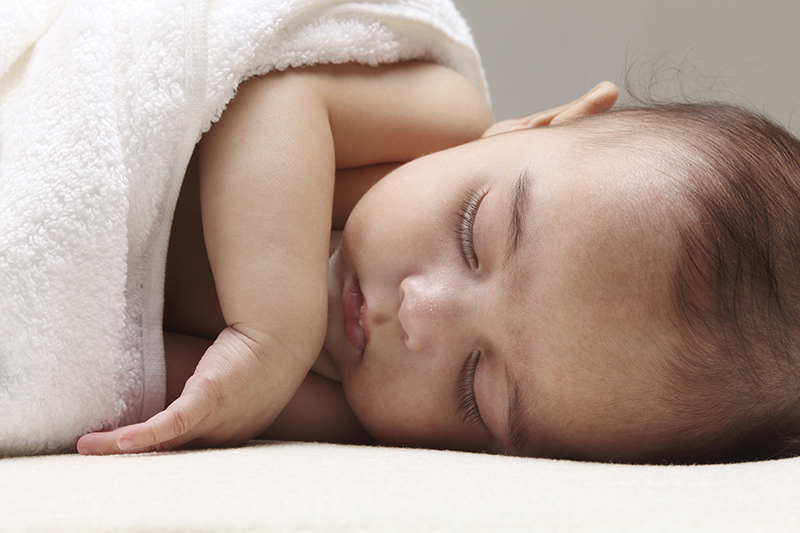Families For Life | Baby Sleep: 2-12 Months-Babies

By around six months, your baby might be sleeping for longer periods and waking less during the night. But baby sleep habits and patterns depend a lot on both temperament and sleep routines.
Baby sleep: how much babies need
At night
Between 2 and 12 months, babies generally sleep 9-12 hours at night. Most babies aged 7-12 months go to bed between 6 pm and 10 pm.
During the day
At this age, most babies sleep for 2-4½ hours during the day, divided between morning and afternoon naps. Your baby might have 1-4 naps during the day, lasting between 30 minutes and 2 hours each.
Daytime sleeps decrease as babies get older, and their awake time between sleeps increases.
By the time your baby is six months old, baby might be sleeping for six or more hours at a time. Your baby might still be waking you during the night, but this should be happening less often.
How babies sleep
The biological basis of baby sleep changes between 2 and 12 months.
In the early months of life, when sleep patterns aren’t well established, baby sleep tends to be divided into 50% active sleep and 50% quiet sleep. Babies often wake after phases of active sleep.
At around three months, sleep patterns become more regulated and can be divided into cycles of light sleep and deep sleep. The amount of light sleep decreases, and the cycles of light and deep sleep last 20-50 minutes (compared with 90-minute sleep cycles for adults).
By six months, baby sleep patterns are closer to those of grown-up sleep – which means less waking at night.
By eight months, 60-70% of babies can settle themselves back to sleep without a parent’s help. Others keep waking if they need help to settle back to sleep, or if they’re still having breastfeeds or bottles during the night.
Baby sleep and development
At around six months, your baby will develop lots of new abilities that can affect sleep.
For example, at this age babies gain the ability to keep themselves awake. At the same time, they’re learning many exciting new skills. The combination of being able to do exciting things and being able to stay awake means your baby might wake more often during the night and be more reluctant to go back to sleep.
Crawling
Settling difficulties can happen at the same time as crawling. You might notice your baby’s sleep habits changing when she starts moving around more.
Object permanence
At around six months, your baby will also figure out object permanence. This means that your baby can remember that things exist, even when they’re out of sight.
This important development in thinking and learning can affect sleep. Your baby used to think that you didn’t exist whenever you left the bedroom. Now your baby knows you’re still there – somewhere. This means that if babies wake during the night, they might call or cry out because they know that mum or dad is there to come to them.
Separation anxiety
At 6-12 months, it’s also common for babies to begin to experience separation anxiety. This is when your baby gets upset because you’re not around. It might lead to a phase where your baby doesn’t want to go to sleep and wakes up more often in the night.
Feeding
Once babies are six months old, they don’t need to be fed during the night.
From this time on, if your baby is developing well, it’s okay to think about night weaning and phasing out night feeds. But if you’re comfortable with feeding your baby during the night, there’s no hurry to phase out night feeds.
You can choose what works best for you and your baby.
How baby sleep patterns affect grown-ups
Most parents of babies under six months of age are still getting up in the night to feed and settle their babies. For many this keeps going after six months.
Some parents find that this is okay as long as they have enough support and other times they can catch up on sleep. For others, getting up in the night over the long term has a serious impact on them and their family life.
Like all aspects of child development, the strength of your relationship with your baby, and the quality of your interactions during the day, can affect both the quality and quantity of your baby’s sleep.
Also, the quality of your sleep can affect your health and your mood. Being exhausted can make it hard to give your baby positive attention during the day.
If things haven’t improved, or the difficulties are starting to upset you, seek professional help. There are ways to make sure that everyone gets the sleep they need.
© raisingchildren.net.au, translated and adapted with permission
Explore more